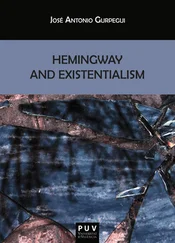In the case of denying one's facticity, Sartre offers an example of a woman on a first date with a man. As the man reaches out and takes her hand at the end of the evening, the woman pretends not to notice and denies the intimacy and sexually charged implications of the act. In “neither consenting nor resisting” (97), she acts in bad faith because she refuses to see that she has committed herself to a pattern of conduct, denying that the act of touching is bound up with the facticity of her body as an object of desire. She looks down on the event from a standpoint of intellectual detachment as if it were not her own body , as if she were simply a passive object. “She has disarmed the actions of her companion,” says Sartre, “by reducing them to being only what they are; that is, to existing in the mode of the in-itself” (98).
But neither the waiter nor the woman can become authentic by simply being ‘ sincere ’ with themselves and taking responsibility for their respective transcendence or facticity. This is because the self is fundamentally unstable; it is a “double property … that is at once a facticity and a transcendence ” (98). Whatever role or identity I happen to commit myself to, I am also ‘not’ that person because I am constantly reversing back and forth, regarding myself solely in terms of facticity or solely in terms of transcendence. Sartre explains this instability with an example of the homosexual who refuses to be sincere and accept who he is. “The homosexual recognizes his faults,” writes Sartre, “but he struggles with all his strength against the crushing view that his mistakes constitute for him a destiny. He does not wish to let himself be considered as a thing. He has an obscure but strong feeling that a homosexual is not a homosexual as this table is a table or as this red-haired man is red-haired” (107). In his reluctance to accept that his desires and past patterns of conduct suggest ‘a destiny’ that constitutes him as certain kind of ‘being-in-itself,’ the homosexual is in bad faith by denying his facticity. But what if, asks Sartre, “in the name of sincerity [and] of freedom … the homosexual reflected on his situation and acknowledged himself as a homosexual” (108)? In this case, the homosexual would still be in bad faith because he would see himself as a thing, as a homosexual , in the way that ‘this table is a table.’ Being sincere, then, has nothing to do with authenticity because, in committing ourselves to a particular identity, we strip away the possibility of transcendence by reducing ourselves to a thing.
For Sartre, the ‘double property’ of selfhood means that we can never be anything . Being a homosexual, for example, is a matter of accepting a particular identity and maintaining this identity by means of certain choices and actions. A homosexual, then, is not something ‘I am’; it is something I create and constitute through my ongoing, moment-to-moment decisions. In this sense, it is an identity that is never stable and complete; it is something I can freely modify or reject at some point down the line. Again, this is why “[I am] what I am not ” (103). Whatever I am as a complete and determined ‘being-in-itself’ is penetrated by the ‘not’ of choice and consciousness, of ‘being-for-itself.’ And there is no way to achieve a unity or synthesis between these two aspects, to become ‘in-and-for-itself.’ It is because of this structural instability that self-deception and bad faith are impossible to avoid. It is, as Sartre says, an “immediate [and] permanent threat to every project of the human being” (116). But where does that leave us with respect to authenticity? Being and Nothingness isn't very helpful. In this work, Sartre refers to ‘authenticity’ ( authenticité ) as a kind of “self-recovery of being which was previously corrupted” (116), but he does not explain what this self-recovery consists of. Yet from our previous discussion of bad faith and looking at his reflections on authenticity in other works, we can get a sense of what he has in mind.
In his War Diaries , Sartre describes the possibility of being shaken out of bad faith with an example of a young man being called up to war:
I can imagine someone being called up who was a highly inauthentic bourgeois, who used to live inauthentically in all the various social situations into which he was thrown — family, jobs, etc. I can grant that the shock of war may suddenly have induced him to a conversion towards the authentic, which leads him to be authentically in situation vis-à-vis the war. But this authenticity, if it is true, needs to conquer new territory. It first presents itself in the form of a desire to revise an old situation in the light of this change. It first gives itself as anxiety and critical desire. Here, this way of extending authenticity mustn't be confused in any sense with an increase in authenticity. The authenticity is already there . Only it must be consolidated and extended. (1996, 280)
In this transformation, the socially prescribed identities that create the illusion that the young man is a secure and complete thing, a being ‘in-itself,’ collapses. He is now “no longer a ‘family man,’ he's no longer practicing his profession, etc.” (280). These public personas cannot provide a ground or support for his being anymore. He now sees that any identity that he takes over can be called into question. But authenticity (or ‘good faith’) is not just a matter of questioning; it is acting in a new way, changing one's life in the face of the question. “The desire to call [oneself] into question, if it is sincere, can appear only against a background of authenticity. And it's not enough to call into question: it's necessary to change” (280, my emphasis). Sartre is suggesting that authenticity, as ‘self-recovery,’ is a twofold process. First, it requires a lucid awareness and acceptance of the structural instability or ambiguity at the core of the self. And second, it requires a willingness to act and “adapt one's life” (280) to this ambiguity. In good faith, the young man acknowledges his factical situation, that his past actions added up to being a particular kind of person, but he simultaneously acknowledges his transcendence, seeing that this pattern of conduct does not determine who he will be in the future, because he can freely choose to act from a range of possibilities that are open to him and that he alone is responsible for these choices. This is why Hazel Barnes writes that “the existentialist in good faith will recognize that at any moment, simultaneously, he is and is not his situation” (1967, 55). Sartre explains this position in Anti-Semite and Jew when he writes, “Authenticity, it is almost needless to say, consists in having a true and lucid consciousness of the situation, in assuming the responsibilities and risks it involves, in accepting it … sometimes in horror and hate” (1948a, 90). But authenticity is never secure; the man will always be tempted to flip back into self-deception. When the war ends, his wife and friends will call on him to take over his old identity and be the man that he used to be. This is the test. “Perhaps he'll yield,” says Sartre, “but he can't revert to this old error vis-à-vis [his wife] without, at a stroke, tumbling headlong into inauthenticity” (1996, 281).
Sartre's account seems especially bleak because whatever identity or project I happen to commit myself to in the attempt to be true to myself is ultimately arbitrary and futile because of the structural instability of the self. In her Ethics of Ambiguity , Beauvoir describes Sartre's position as one that encloses man in a sterile anguish, in an empty subjectivity. It is incapable of furnishing him with any principle for making choices. Let him do as he pleases. In any case, the game is lost. Does not Sartre declare, in effect, that man is a ‘useless passion,’ that he tries in vain to realize the synthesis of the for-oneself and the in-oneself, to make himself God? (1948, 10)
Читать дальше












